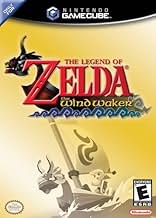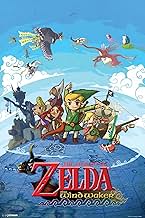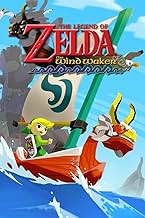VALUTAZIONE IMDb
9,0/10
3840
LA TUA VALUTAZIONE
Aggiungi una trama nella tua linguaAfter his sister gets kidnapped from their peaceful island, a young boy aims to emulate the Hero of Time by saving her.After his sister gets kidnapped from their peaceful island, a young boy aims to emulate the Hero of Time by saving her.After his sister gets kidnapped from their peaceful island, a young boy aims to emulate the Hero of Time by saving her.
- Ha vinto 1 BAFTA Award
- 4 vittorie e 16 candidature totali
Nate Bihldorff
- Salvatore
- (voce)
Sachi Matsumoto
- Link
- (voce)
- …
Hironori Miyata
- Tingle
- (voce)
Takashi Nagasako
- Ganondorf
- (voce)
- (as Takeshi Nagasako)
Chiaki Takahashi
- Medli
- (voce)
Trama
Lo sapevi?
- QuizAt night, there are actual constellations in the sky.
- BlooperStaircases in the latter parts of the game appear to use ramp collision instead of the standard stair programming seen in earlier stairs in the game.
- Curiosità sui creditiWhile the credits roll, the background is underwater and bubbles that show every character in the game go by.
- ConnessioniFeatured in Icons: Miyamoto (2002)
Recensione in evidenza
As a young boy, I played the first three (S)NES installments in the Legend of Zelda series, and was quite hooked by the rich mythology, combat and exploration element in the games. However, not owning a GameBoy or Nintendo 64 made me miss all the installments for those systems, so I was out of the Zelda experience for several years. The Wind Waker was a very welcome re-introduction to the series after all those years of absence, and it actually sparked my interest in Ocarina of Time as well.
Ocarina of Time was the first Zelda game to venture into three-dimensional gaming, and it also employed a very sophisticated narrative that went far beyond the straightforward dungeon-to-dungeon plot that hallmarked the first installments. Wind Waker was not only a revolution in graphics, but it also perfected the level of storytelling in the series. You start out with a nice background story and with young Link, who is embarking on a great adventure on the Great Sea when his little sister is kidnapped, and he is forced to tag along with a bunch of pirates; as the player, you need to find the story by following clues, obtaining objects and talking with other characters. Watching the plot unfold as you play is half the fun, and involves not only puzzle-solving, but also mastering the way of sword combat. It is nice to see how this game continues where Ocarina of Time left off; it uses the known elements of the series, like Link, Zelda, Ganon and the Triforce, and takes it in unexpected directions. For example: how many games take the hero to the big boss' stronghold already in the very beginning? Or skips the obligatory happy end for a more bitter-sweet finale?
The cell-shaded graphics in Wind Waker are the giant leap forward in the series, and showed what the GameCube system was capable of. However, it was also the reason why it was scathingly called 'Celda' after its release, which summarized the view of many who thought the game was much too kid-friendly. There is little denial that the game, with its lush cartoonesque animations and underage hero, caters to a young audience; but let's face it, the rest of the series was targeted at minors too, and weren't we all kids when we were introduced to it? Granted, the game does not look as dark or scary as Ocarina was at times, but that was mainly due to some creepy dungeons, like the one in the graveyard. Perhaps also the limitations in animation made that game seem a bit unpolished and grim, and drew less comparisons to a family-friendly cartoon. Wind Waker also has plenty of tense and dark moments (those hands from the floor and the screaming zombies still freak me out), but the unique selling point is the staggeringly high production value, almost the quality of a hand-drawn Disney feature, making it akin to a interactive cartoon; but at no point did I get the feeling that the mature audience was not taken seriously, because the game keeps the focus on an intricate and adventurous story.
Ocarina of Time introduced a revolutionary targeting system that enabled effective fighting, which has been further perfected for Wind Waker. In Ocarina, the camera would often take an annoying position that didn't quite give the best view of the fight; in Wind Waker, no matter what happens, the camera always shoots the action from an optimal angle, and you can always modify it to your preference. The array of sword moves has been expanded to include combos and rolling moves, which, together with the camera work and awesome graphics, creates fight scenes that would not feel out of place in a Prince of Persia game.
It was a very bold move to introduce a radical change of scenery in this game. The familiar forests, swamps, lakes, fields and deserts have been been replaced by The Great Sea, where isolated islands still contain sparse inhabitants and civilization, so more than ever does the player need to explore and keep a sense of direction. This makes for another epic new element: the sailing; although many fans thought it was long-winded, tedious and uneventful, I found the sailing a great part of the exploration, especially because the game keeps changing the circumstances: day changing to night, sunshine suddenly turning into lightening storms, and the unexpected discoveries on the vast ocean, as well as a couple of nice battles, made the sailing alluring enough. True, sometimes the distances were a bit long and the backdrop a bit monotonous, but backtracking through familiar scenery is also an integral part of the Zelda experience. As with most Zelda games, there comes a point where the player can warp to certain places, which saves precious traveling time, and there are a few locations in the game that bring back pleasant memories to Ocarina.
If there is one point of criticism that I agree with, it is that the game is a bit too short; the main quest is relatively brief, and the number of dungeons a bit meager compared to the amount of terror-filled challenges that Ocarina and Link to the Past offered. But, on the good side, the Great Sea is where most of the sidequests take place, another staple of the series that usually makes up more than half of the playing time.
To conclude, a lot of fans were initially displeased with Wind Waker, but judging by the very positive reviews here on the site, I think it is safe to say that I am not the only one to express his admiration for this little masterpiece. Not that it is necessarily my favorite Zelda game, but it is a great entry anyway that has shaped the series and the face of gaming for years to come.
Ocarina of Time was the first Zelda game to venture into three-dimensional gaming, and it also employed a very sophisticated narrative that went far beyond the straightforward dungeon-to-dungeon plot that hallmarked the first installments. Wind Waker was not only a revolution in graphics, but it also perfected the level of storytelling in the series. You start out with a nice background story and with young Link, who is embarking on a great adventure on the Great Sea when his little sister is kidnapped, and he is forced to tag along with a bunch of pirates; as the player, you need to find the story by following clues, obtaining objects and talking with other characters. Watching the plot unfold as you play is half the fun, and involves not only puzzle-solving, but also mastering the way of sword combat. It is nice to see how this game continues where Ocarina of Time left off; it uses the known elements of the series, like Link, Zelda, Ganon and the Triforce, and takes it in unexpected directions. For example: how many games take the hero to the big boss' stronghold already in the very beginning? Or skips the obligatory happy end for a more bitter-sweet finale?
The cell-shaded graphics in Wind Waker are the giant leap forward in the series, and showed what the GameCube system was capable of. However, it was also the reason why it was scathingly called 'Celda' after its release, which summarized the view of many who thought the game was much too kid-friendly. There is little denial that the game, with its lush cartoonesque animations and underage hero, caters to a young audience; but let's face it, the rest of the series was targeted at minors too, and weren't we all kids when we were introduced to it? Granted, the game does not look as dark or scary as Ocarina was at times, but that was mainly due to some creepy dungeons, like the one in the graveyard. Perhaps also the limitations in animation made that game seem a bit unpolished and grim, and drew less comparisons to a family-friendly cartoon. Wind Waker also has plenty of tense and dark moments (those hands from the floor and the screaming zombies still freak me out), but the unique selling point is the staggeringly high production value, almost the quality of a hand-drawn Disney feature, making it akin to a interactive cartoon; but at no point did I get the feeling that the mature audience was not taken seriously, because the game keeps the focus on an intricate and adventurous story.
Ocarina of Time introduced a revolutionary targeting system that enabled effective fighting, which has been further perfected for Wind Waker. In Ocarina, the camera would often take an annoying position that didn't quite give the best view of the fight; in Wind Waker, no matter what happens, the camera always shoots the action from an optimal angle, and you can always modify it to your preference. The array of sword moves has been expanded to include combos and rolling moves, which, together with the camera work and awesome graphics, creates fight scenes that would not feel out of place in a Prince of Persia game.
It was a very bold move to introduce a radical change of scenery in this game. The familiar forests, swamps, lakes, fields and deserts have been been replaced by The Great Sea, where isolated islands still contain sparse inhabitants and civilization, so more than ever does the player need to explore and keep a sense of direction. This makes for another epic new element: the sailing; although many fans thought it was long-winded, tedious and uneventful, I found the sailing a great part of the exploration, especially because the game keeps changing the circumstances: day changing to night, sunshine suddenly turning into lightening storms, and the unexpected discoveries on the vast ocean, as well as a couple of nice battles, made the sailing alluring enough. True, sometimes the distances were a bit long and the backdrop a bit monotonous, but backtracking through familiar scenery is also an integral part of the Zelda experience. As with most Zelda games, there comes a point where the player can warp to certain places, which saves precious traveling time, and there are a few locations in the game that bring back pleasant memories to Ocarina.
If there is one point of criticism that I agree with, it is that the game is a bit too short; the main quest is relatively brief, and the number of dungeons a bit meager compared to the amount of terror-filled challenges that Ocarina and Link to the Past offered. But, on the good side, the Great Sea is where most of the sidequests take place, another staple of the series that usually makes up more than half of the playing time.
To conclude, a lot of fans were initially displeased with Wind Waker, but judging by the very positive reviews here on the site, I think it is safe to say that I am not the only one to express his admiration for this little masterpiece. Not that it is necessarily my favorite Zelda game, but it is a great entry anyway that has shaped the series and the face of gaming for years to come.
I più visti
Accedi per valutare e creare un elenco di titoli salvati per ottenere consigli personalizzati
Dettagli
- Data di uscita
- Paese di origine
- Siti ufficiali
- Lingue
- Celebre anche come
- The Legend of Zelda: The Wind Waker
- Aziende produttrici
- Vedi altri crediti dell’azienda su IMDbPro
Contribuisci a questa pagina
Suggerisci una modifica o aggiungi i contenuti mancanti










